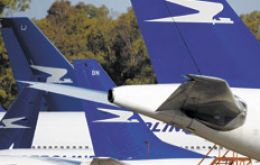MercoPress. South Atlantic News Agency
Argentina
-
Wednesday, December 24th 2008 - 20:00 UTC
Argentina reports lowest growth in five years in October
Argentina reported the lowest economic growth in more than five years in October as factories cut output because of waning sales and exports. The country's economic activity index expanded 5.2% in October compared to the same month a year ago and 0.1% over September.
-
Wednesday, December 24th 2008 - 20:00 UTC
Argentine federal court will investigate ex President Kirchner

An Argentine court will investigate former President Nestor Kirchner, the husband and predecessor of President Cristina Fernandez de Kirchner, over possible irregularities in government contracts, court officials confirmed on Tuesday in Buenos Aires.
-
Tuesday, December 23rd 2008 - 20:00 UTC
Argentine exports suffer 6% slowdown in November
Argentine exports in November experienced their first decrease in six years falling 6% to 5.1 billion US dollars as a direct consequence of lower commodities prices and smaller volumes of soy shipped to China. This represented a significant 7.3% drop in the month's trade surplus, 952 million USD compared to a year ago.
-
Tuesday, December 23rd 2008 - 20:00 UTC
Argentines most optimistic global citizens on 2009
Following a year full of political events and tension, basically the several month-long conflict between the Argentine government and farmers, Argentines are among the most optimistic about 2009 according to a world public opinion poll from TNS Gallup.
-
Friday, December 19th 2008 - 20:00 UTC
Argentine court orders release of jailed officers

The order to release of 12 torture suspects from Argentina's 1976-1983 military dictatorship unleashed a storm of condemnation from President Cristina Fernandez as well as human rights organizations in Argentina Thursday.
-
Thursday, December 18th 2008 - 20:00 UTC
Patagonia unveils it was the land of a giant, vicious raptor

Scientists have discovered what they say is a completely unexpected new giant dinosaur that lived 70 million years ago in Argentina. At 5 to 6.5 meters long, depending on its tail size, Austroraptor cabazai is among the largest of the slender, carnivorous, two-legged dinosaurs called raptors, said Fernando Novas, the lead researcher behind the discovery.
-
Thursday, December 18th 2008 - 20:00 UTC
Creditors group condemns Ecuadorian decision to default

The American Task Force Argentina (ATFA) condemned on Thursday Ecuadorian President Rafael Correa's decision to default on 3.8 billion US dollars in government debt owed to foreign lenders, the country's second such default in the last decade.
-
Thursday, December 18th 2008 - 20:00 UTC
Argentine Congress backs expropriation of flag air carrier

The Argentine Congress on Wednesday backed a government plan to expropriate Argentina's flag carrier and biggest airline after months of negotiations with the company's Spanish owners broke down.
-
Tuesday, December 16th 2008 - 20:00 UTC
Argentina bolsters size of the stimulus package to 32 b. USD

Argentina will spend the equivalent of 16.6 billion USD on infrastructure projects next year in an attempt to create 380,000 construction-related jobs it was announced Monday in Buenos Aires.
-
Tuesday, December 16th 2008 - 20:00 UTC
Kirchner government admits Botnia plant “does not pollute”

The administration of Argentine President Cristina Fernandez de Kirchner openly supported the provincial governor who declared that a pulp mill on the Uruguayan side of a jointly managed water course, --and at the heart of a bitter dispute between the neighbouring countries--, “does not contaminate”.
